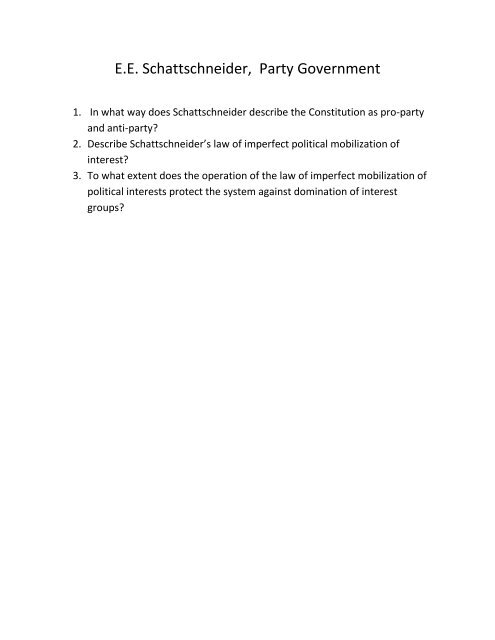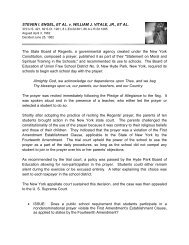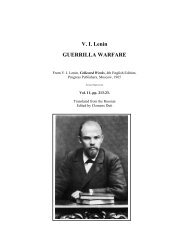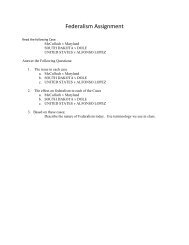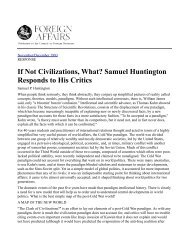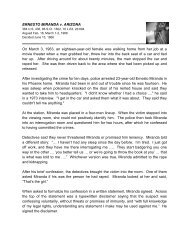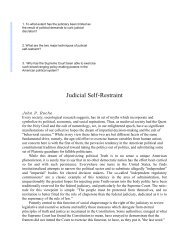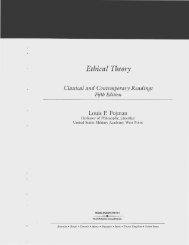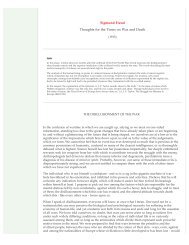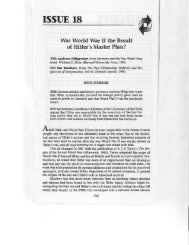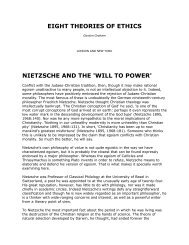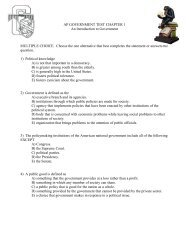E.E. Schattschneider, Party Government - jessbcuzz
E.E. Schattschneider, Party Government - jessbcuzz
E.E. Schattschneider, Party Government - jessbcuzz
Create successful ePaper yourself
Turn your PDF publications into a flip-book with our unique Google optimized e-Paper software.
E.E. <strong>Schattschneider</strong>, <strong>Party</strong> <strong>Government</strong><br />
1. In what way does <strong>Schattschneider</strong> describe the Constitution as pro-party<br />
and anti-party?<br />
2. Describe <strong>Schattschneider</strong>’s law of imperfect political mobilization of<br />
interest?<br />
3. To what extent does the operation of the law of imperfect mobilization of<br />
political interests protect the system against domination of interest<br />
groups?
E. E. <strong>Schattschneider</strong><br />
PARTY GOVERNMENT<br />
The Convention at Philadelphia provided a constitution with a dual attitude: it<br />
was proparty in one sense and antiparty in another. The authors of the Constitution<br />
refused to suppress the parties by destroying the fundamental liberties in which parties<br />
originate. They or their immediate successors accepted amendments that guar-
E. E. Schattschneidcr 171<br />
anteed civil rights and thus established a system of party tolerance, i.e., the right to<br />
agitate and to organize. This is the proparty aspect of the system. On the other<br />
hand, the authors of the Constitution set up an elaborate division and balance of<br />
powers within an intricate governmental structure designed to make parties ineffective.<br />
It was hoped that the parties would lose and exhaust themselves in futile attempts<br />
to fight their way through the labyrinthine framework of the government,<br />
much as an attacking army is expected to spend itself against the defensive works of<br />
a fortress. This is the antiparty part of the Constitution scheme. To quote Madison,<br />
the "great object" of the Constitution was "to preserve the public good and private<br />
right against the danger of such a faction [party] and at the same time to preserve<br />
the spirit and form of popular government."<br />
In Madison's mind the difference between an autocracy and a free republic<br />
seems to have been largely a matter of the precise point at which parties are stopped<br />
by the government. In an autocracy parties arc controlled (suppressed) at the<br />
source; in a republic parties are tolerated hut are invited to strangle themselves in<br />
the machinery of government. The result in either case is much the same, sooner or<br />
later the government checks the parties hut never do the parties control the government.<br />
Madison was perfectly definite and unmistakable in his disapproval of party<br />
government as distinguished from party tolerance. In the opinion of Madison, parties<br />
were intrinsically bad, and the sole issue for discussion was the means by which<br />
had parties might be prevented from becoming dangerous. What never seems to<br />
have occurred to the authors of the Constitution, however, is that parties might be<br />
used as beneficent instruments of popular government. It is at this point that the<br />
distinction between the modem and the antique attitude is made.<br />
The offspring of this combination of ideas was a constitutional system having<br />
conflicting tendencies. The Constitution made the rise of parties inevitable yet was<br />
incompatible with party government. This scheme, in spite of its subtlety, involved a<br />
miscalculation. Political parties refused to be content with the role assigned to them.<br />
The vigor and enterprise of the parties have therefore made American political history<br />
the story of the unhappy marriage of the parties and the Constitution, a remarkable<br />
variation of the case of the irresistible force and the immovable object, which in<br />
this instance have been compelled to live together in a permanent partnership ....<br />
The Raw Materials of Politics<br />
People who write about interests sometimes seem to assume that all interests are<br />
special and exclusive, setting up as a result of this assumption a dichotomy in which<br />
the interests on the one side are perpetually opposed to the public welfare on the<br />
other side. But there are common interests as well as special interests, and common<br />
interests resemble special interests in that they are apt to influence political behavior.<br />
The raw materials of politics are not all antisocial. Alongside of Madison's<br />
statement that differences in wealth are the most durable causes of faction there<br />
should be placed a corollary that the common possessions of the people are the<br />
most durable cause of unity. To assume that people have merely conflicting interests<br />
and nothing else is to invent a political nightmare that has only a superficial
172 Political Parties and the Electorate<br />
relation to reality. The body of agreement underlying the conflicts of a modern society<br />
ought to be sufficient to sustain the social order provided only that the common<br />
interests supporting this unity are mobilized. Moreover, not all differences of<br />
interest are durable causes of conflict. Nothing is apt to be more perishable than a<br />
political issue. In the democratic process, the nation moves from controversy to<br />
agreement to forgetfulness; politics is not a futile exercise like botball, forever<br />
played back and forth over the same ground. The government creates and destroys<br />
interests at every turn.<br />
There arc, in addition, powerful factors inhibiting the unlimited pursuit of<br />
special aims by an organized minority. To assume that minorities will stop at<br />
nothing to get what they want is to postulate a degree of unanimity and concentration<br />
within these groups that does not often exist in real life. If every individual<br />
were e
E. E. SchartschnciJer<br />
suppose that the government is not the captive of hlinJ forces from which thL r,<br />
no escape. There is nothing wrong ahout the raw materials of politics.<br />
~~~~~~~~++++++~~~+~~~~~~~~~~~bbb~~~~AAAAhh


